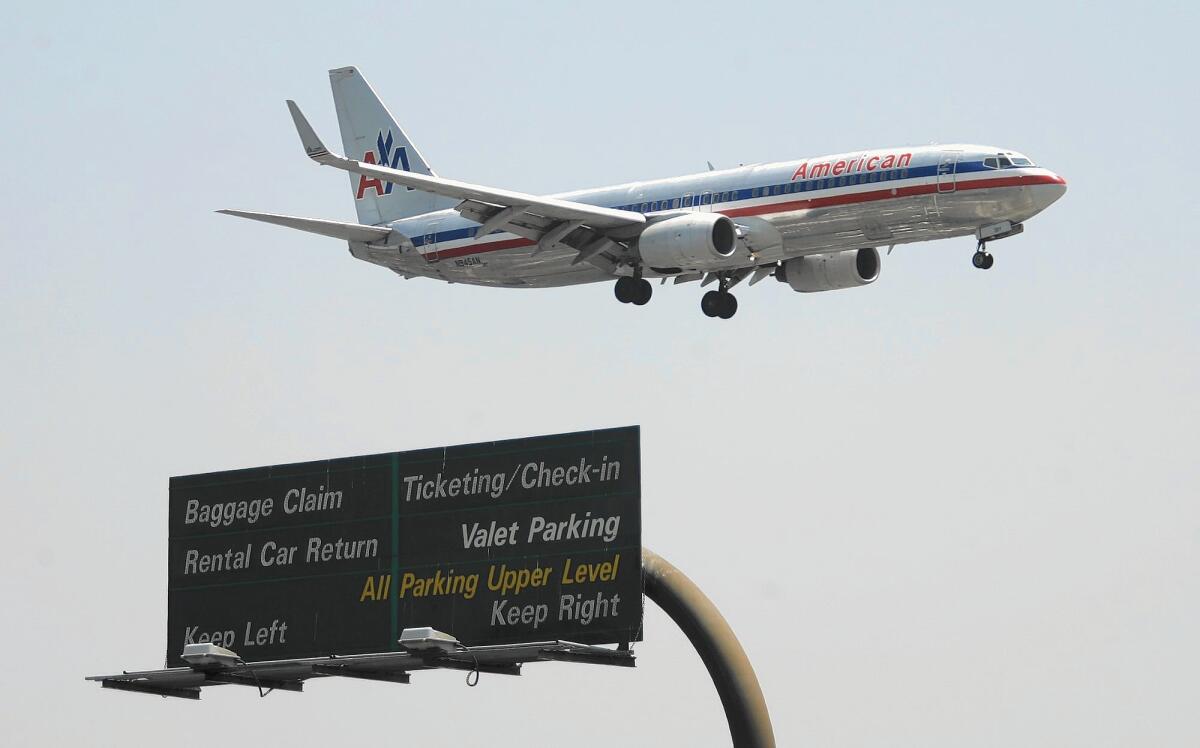FAA change would increase noise and pollution, Balboa Island residents fear

An American Airlines flight prepares to land at John Wayne Airport.
- Share via
Lee Pearl can hear the rumble from the engines of jets departing John Wayne Airport when he’s sitting on the patio of his Balboa Island home.
Before he equipped his windows and doors with double-pane glass, he heard it inside too.
“We’d have to turn up the TV every time a plane flew over,” he said.
Residents of Balboa Island, Peninsula Point and other Newport Beach neighborhoods have lived with planes flying over their homes for years. Recently their concerns have been heightened by a Federal Aviation Administration proposal to narrow the flight paths at 11 Southern California airports — including John Wayne.
The possible change is tied to FAA efforts to replace traditional ground-based air traffic procedures with satellite-based technology at those facilities.
The agency believes the Next Generation Air Transportation System could save fuel, reduce emissions and delays and shorten flight times by establishing flight plans that are less dispersed.
Most of the planes that depart from John Wayne follow a route that takes them across Upper Newport Bay before passing over Balboa Island and the end of the Balboa Peninsula and turning around a few miles over the ocean.
Under the current system, the pilot has more control of the takeoff route. Under the new system, a precise takeoff path can be programmed into the plane’s flight plan.
Some Balboa Island residents are concerned that if the FAA’s plan is put in place, flights will become even more concentrated over their homes, potentially causing increased pollution and noise.
“The NextGen systems using GPS has increased the accuracy of the departures to keep planes in their exact lane,” the Balboa Island Improvement Assn. wrote in a letter to the FAA. “This technology may actually be increasing the negative environmental impacts on those directly under the departure pattern.”
The FAA’s draft environmental assessment of the project shows no significant or reportable pollution or noise effects.
Airplane noise and pollution concerns are not new to many communities in Newport Beach.
Decades ago, the city entered into an agreement with John Wayne Airport, Orange County and two communities that established a flight curfew and limits on noise and the number of passengers and departures. The noise-abatement agreement stemmed in part from residents’ complaints. In 2014, the parties extended the agreement through December 2030.
As part of the pact, the county established seven noise monitors along the airport’s departure corridor. For years, air carriers used noise-abatement procedures during departures, such as ascending rapidly and “throttling back” the engine when flying over homes. More recently, planes have technology that reduces the sound of the engines, and many airlines no longer need to use the abatement measures to meet sound requirements.
By the time planes fly over the peninsula and Balboa Island, they are no longer being monitored for sound, making the agreement unhelpful for mitigating noise in those areas, according to city documents and residents.
Proposing changes to flight paths is challenging for the city, Mayor Ed Selich said, because it has little control or input over the FAA’s plans. Newport Beach also has an interest in maintaining a positive relationship with the FAA to ensure that the settlement agreement is unchanged and that the agency continues to listen to the city’s concerns, he said.
“If you try to save Balboa Island, you’re going to impact everyone else,” Selich said. “You pit neighborhoods against one another that way.”
But Pearl and Terry Janssen — president of the improvement association — said the plan they are advocating would reduce noise and safety risks for the city as a whole, not just Balboa Island.
“It’s what’s in the best interest for the majority of Newport Beach,” Pearl Janssen said.
Fry writes for Times Community News
More to Read
Get the Latinx Files newsletter
Stories that capture the multitudes within the American Latinx community.
You may occasionally receive promotional content from the Los Angeles Times.







